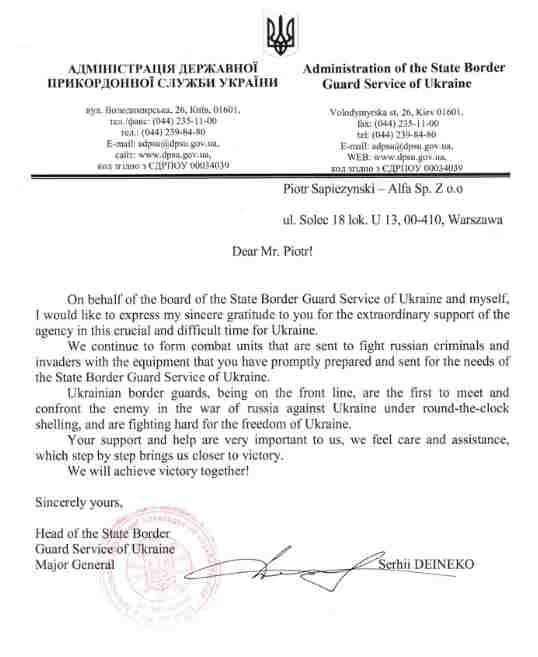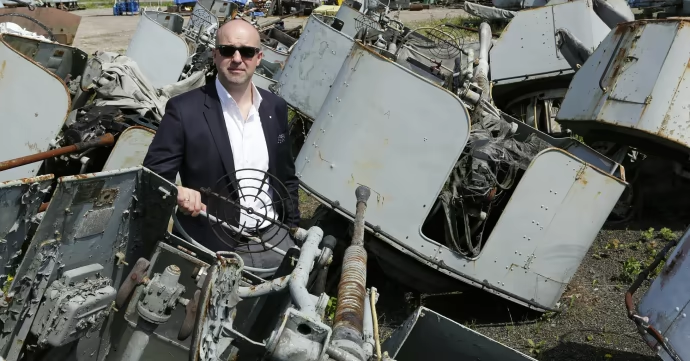Апрель 2022 года. Прошло чуть больше недели, как ВСУ оттеснили российские войска от Киева и выгнали из Киевской области. Но уверенности, что оккупанты снова не попытаются штурмовать столицу, не было.
Въезды в Киев продолжали перекрывать бетонные плиты и насыпи песка, на большинстве перекрестков стояли блокпосты с очень придирчивыми смотрящими из теробороны и армии.
Но город начинал понемногу оправляться от пережитого. Первыми оживали магазинчики и кафе. Появились километровые пробки не на выезд, а на въезд в Киев. Жизнь в буквальном смысле возвращалась в столицу. Но, к сожалению, возвращалось не только хорошее.
11 апреля 2022 года Минобороны заключает крупный контракт на поставку критически нужных в то время вещей: 20 тысяч баллистических шлемов, 20 тысяч бронежилетов и 40 тысяч бронеплит к ним. Сумма сделки — 24,5 миллиона евро со 100-процентной предоплатой.
Именно после этой сделки в контрактах МОУ появится некая польская фирма «Alfa». Ее появление ознаменует не вступление в большую историю международного успеха, а сагу об одном из топ-10 крупнейших должников Минобороны. В начале 2023-го «Alfa» по разным контрактам имела задолженностей перед МОУ на более чем три с половиной миллиарда гривен.
Чтобы понять, как так произошло, достаточно сказать, что из упомянутой выше партии «Alfa», хоть и со срывом сроков, смогла поставить все бронежилеты и плиты. А вот из привезенных ею 16 тысяч шлемов 11 тысяч вернули сразу как непригодные, а еще 5 тысяч так и лежали на складе, не принятые на баланс ВСУ.
И несмотря на факты срыва поставок, 25 октября 2022 года Минобороны снова заказывает у «Alfa» еще 20 тысяч шлемов и 50 тысяч бронежилетов на сумму почти 50 миллионов евро. На этот раз обошлось без предоплаты.
И это хорошо, ведь шлемы так и не приехали в Украину, а половина поставленных бронежилетов не прошла баллистических испытаний.
Однако даже эти два контракта, каждый из которых больше скандального кейса с турецкими куртками, выглядят смешными по сравнению с теми соглашениями на поставки оружия, о которых речь пойдет ниже.
Как выяснила УП, польская фирма получила и вывела из Украины миллиарды и миллиарды гривен. А вот реализовать поставки оплаченного оружия не смогла.
Что это за контракты и какова судьба украинских денег, выясняла «Украинская правда».
«Золотой» апрель для «Alfa» в Минобороны
«Любовь» департамента военно-технической политики МОУ к польской компании имеет интересную природу. Она напоминает волновое помутнение сознания, когда в один миг делается что-то такое, за что потом долго себя коришь. Пока не приходит новая волна.
Большинство сделок с государственными поставщиками оружия, о которых писала УП в тексте о «спецмародерах», стали публичными после исков Минобороны в хозяйственный суд. Контракты с «Alfa» в украинских судах МОУ не оспаривает, потому что это иностранная компания.
Такие дела должны рассматривать в международном арбитраже и подаваться через представительство Международного коммерческого арбитражного суда при Торгово-промышленной палате. А их деятельность не публикуется, как тот же судебный реестр.
Однако, даже несмотря на это, УП известно в целом о по меньшей мере семи соглашениях, которые МОУ заключило напрямую с «Alfa». Часть из них уже оспаривают в упомянутом арбитраже.
Интересно, что соглашения подписывались пакетами, когда в Минобороны были некие «дни Альфы».
Первый такой день прошел 22 апреля 2022 года. Тогда одним махом с фирмой «Alfa» было заключено три соглашения на сумму около 3,3 миллиарда гривен (почти 64,4 миллиона евро). По каждой из них польская компания получила по 50% аванса.
Речь шла о поставках нескольких самоходных гаубиц «Гвоздика», 122-мм боеприпасов к гаубице Д-30 и 122-мм ракет к «Граду».
Насколько известно УП, из законтрактованного оружия приехало лишь небольшое количество. Припасов к Д-30 с большим опозданием приехала лишь десятая часть, ракет к «Граду» — треть, а «Гвоздики», хоть и приехали все, но в таком состоянии, что точно не соответствует заявленному в соглашении техническому классу, и МОУ сейчас пытается выбить из поставщика компенсацию.
По состоянию на начало 2023-го по трем апрельским соглашениям 2022 года «Alfa» имела почти 1,7 миллиарда гривен дебиторской задолженности перед МОУ. На эти деньги можно было бы, например, достроить три музея Голодомора.
Но самое возмутительное в соглашениях с «Alfa» даже не это. Через пять дней после подписания этой компанией прямых соглашений с МОУ, то есть 27 апреля 2022 года, Минобороны заключило еще три интересных контракта.
На этот раз поставщиком был уже государственный специмпортер оружия — фирма «Прогресс», которая должна была поставлять похожие виды боеприпасов, что и польская фирма.
Сумма трех соглашений с госкомпанией достигала более 17 миллиардов гривен. Самое интересное, что болгарские выстрелы к Д-30, Д-20 и реактивные снаряды для «Градов», по данным УП, «Прогресс» должен был покупать через ту же польскую фирму «Alfa».
Насколько известно «Украинской правде», сделки с поляками в «Прогрессе» курировал заместитель директора и бывший заместитель министра обороны Александр Миронюк. Он известен читателям УП по скандальному обыску в уголовном деле о закупке некачественных бронежилетов, в ходе которого у Миронюка обнаружили миллионы различной валюты в диване.
То есть за 5 дней польская компания получила различных контрактов от Украины на почти 21 миллиард гривен.
Может возникнуть вопрос: а в чем проблема, если фирма будет поставлять и напрямую, и через другую компанию? Ответ: в цене. Те же снаряды от тех же производителей в прямых сделках «Alfa» и в контрактах «Прогресса» отличались на десятки процентов.
Например, польская фирма должна была поставлять 122-мм выстрелы с полным зарядом к гаубицам Д-30/2С1 по 760 евро, а «Прогресс» такие же выстрелы — по 1195 евро. 435 евро или плюс 57% на одном снаряде, законтрактованном, по сути, у той же фирмы с разницей в пять дней.
Неудивительно, что этот контракт для «Прогресса» польский подрядчик выполнял гораздо эффективнее, чем собственный на поставку таких же снарядов, но на 57% дешевле: контракт «Alfa» выполнен был на 10%, а вот «Прогресс» с задержками, но около 80% поставки сделал.
Но даже несмотря на такую вопиющую накрутку конкретно по этому соглашению государственный специмпортер на начало 2023 года имел более 200 миллионов гривен задолженности перед Минобороны.
Июнь на миллиард: второй день «Alfa» в МОУ
В конце мая 2022 года польская «Alfa» должна была завершить поставки снарядов по апрельским контрактам. Но, как уже догадались читатели, даже не приблизилась к этой цели.
Поэтому с горем-бедой поставщик договорился о продлении сроков поставок до июля 2022-го.
Но 13 июня того же года происходит нечто совершенно непостижимое. Зная о том, что фирма срывает предыдущие контракты, Минобороны решило дать компании «Alfa» еще несколько миллиардов гривен армейских денег.
В тот день было заключено еще три контракта на сумму около 2,6 миллиарда гривен. Половину этой суммы компания снова получила в качестве предоплаты.
Все три соглашения были вероятно подписаны со стороны МОУ руководителем департамента военно-технической политики Шостаком, которого неделю спустя, в июне 2022-го, снимут с должности.
На этот раз контракты предусматривали поставку:
- 120-мм мин (более 11 миллионов евро аванса);
- 152-мм выстрелы для гаубицы «Гиацинт» (18 миллионов евро аванса);
- 152-мм выстрелы к САУ «Дана» (13 миллионов евро предоплаты).
- Надо ли говорить, что все три контракта были сорваны?
Выстрелов для «Гиацинта» приехало около 40%; 120-мм мин поставили меньше, чем 1% от контракта; выстрелов к «Дане» не поставили вообще.
Теперь МОУ пытается вернуть 27 миллионов евро предоплаты и взыскать еще почти 13 миллионов евро штрафов за сорванные поставки.
Но даже если это удастся, то неизменным останется ужасный факт: украинская армия год не получала критически важного вооружения и не могла законтрактовать его в другом месте, потому что поставщик вывел деньги из страны.
Да и способна ли польская фирма «Alfa» вернуть полученные авансы?
С чего начинается «Alfa»
Как на фирму с многомиллионными оборотами компания «Alfa» уж слишком незаметна. Правда, осенью 2022 года компания перебралась в центр Варшавы, хотя и в не очень показной офисный центр.
Если вы ждете увидеть золотые буквы над входом в офис фирмы, то зря. Все ограничивается скромной надписью и запретом входа. Сайт фирмы помещается на одной странице, из интересного там разве что благодарность от председателя Госпогранслужбы Украины Сергея Дейнека.

Как следует из выписок из польских реестров, «Alfa» была основана как общество с ограниченной ответственностью еще в 2005 году. Особенно звезд с тех пор эта компания не хватала.
Единственное заметное упоминание об этой фирме датируется 2015 годом, когда ее директор Петр Сапежинский в интервью влиятельному польскому изданию «Polityka» рассказывал, как его компания выигрывает тендеры на утилизацию списанных кораблей военно-морских сил Польши.

В целом фирма занимается торговлей разного рода продукцией, в том числе военной. В 2020 году компания показала 1,23 миллиона злотых (чуть больше, чем 300 тысяч евро) прибыли, в 2021-м «Alfa» заработала 7,4 миллиона злотых (около 1,8 миллиона евро).
Что интересно, финансовой отчетности за 2022 год, когда компания Сапежинского подписала контрактов на сотни миллионов в Украине, «Alfa» до сих пор не подала. Напротив, за первое полугодие 2023 года фирма уже 4 раза меняла данные о себе в реестрах, что может быть способом оттянуть подачу отчетности.
Но как неприметная фирма из Польши стала одним из крупнейших поставщиков и должников Минобороны во времена войны?
Кто в Украине мог лоббировать «Alfa» и выбивать для нее, несмотря на все очевидные предостережения, все новые и новые контракты?
Откуда у скромной компании выходы на закрытый мир болгарской оборонки?
На все эти вопросы «Украинская правда» продолжит искать ответы и попытается расставить все точки над «і» в своих следующих публикациях.


